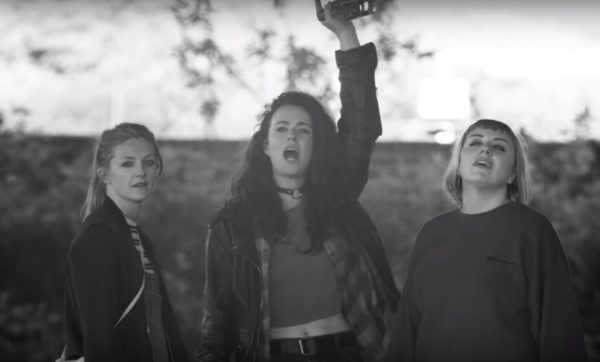Beats, 2019.
Directed by Brian Welsh.
Starring Cristian Ortega, Lorn Macdonald, Laura Fraser and Brian Ferguson.
SYNOPSIS:
It’s Scotland, 1994. Two young friends in West Lothian with a love for techno head for one last night together, before life sends them their separate ways.
For all its horrific, stillborn visage and unforgiving portrait of drug culture, Trainspotting was a worldwide phenomenon, transcending its disturbing content to become a trademark viewing for everyone growing up in Scotland. Beats is another in a long-line of spiritual successors, but this feature is tuned into the power of repetitive beats and brotherhood rather than the floor-sinking aftermath of narcotics.
Played against the backdrop of Blair’s transformation of Britain, the film opens with a passage from The Criminal Justice and Public Order Act (1994), detailing that police can confiscate sound systems, harass party-goers, and most controversially of all, criminalising raves of fewer than a 100 people that are ” wholly or predominantly characterised by the emission of a succession of repetitive beats”. Such authoritarianism feels like an offshoot of the Equilibrium universe, but this very real act gave birth to the underground night culture of today.
Originally a play by Kieran Hurley and adapted for the screen by Brian Welsh, you can feel the material’s theatrical roots. Scenes are placed in different locations for stretches of the runtime, allowing the actors to chat, tangle and soar. The film revolves around the friendship Spanner (Lorn Macdonald) and Johnno (Cristian Ortega), two boys pals since they were small. Spanner comes from a rough family, with a fearsome brother who runs the underworld of the small town. Johnno’s life is peak middle class, going from school to work in the local supermarket, with a loving mum at home (Laura Fraser) and a new stepdad in the form of Robert (Brian Ferguson).
Dialogue is steeped in Scots vernacular, with a countless uses of “ken”, “aye” and “naw”. For natives, the script flows with electricity. What the writers nail is the essence of the country’s friendliness and crassness, showing characters who can threaten: “Wits your problem ya wee creep” and be all smiles in the next second. How well you follow the loose tongue of the film is critical to how much you get from it (subtitles may be wise for some). There’s also the best Flight of the Navigator put down you’ll probably ever hear.
The bulk of the film examines the pair’s straining friendship as the class boundary grows increasingly immediate. Johnno’s mum and step-dad (who also happens to be a policeman) are staunchly against him seeing Spanner. It’s hard not to see why; he’s loud, a bit rude and finds ways to get into trouble. But he’s also smart, fiercely loyal and kind-hearted. The way McDonald portrays him is quite extraordinary; there’s a warm resonance to his turn, managing to be hilarious but really quite heartbreaking within the runtime. Ortega bounces off him adequately, but his performance is strange, one of seemingly constant bemusement, struggling to imbue his actions with relative reason. It’s one thing to be a stroppy teen, but that relatable trait isn’t recognisable in the acting.
Shot by cinematographer Benjamin Kracun in stunning, pellucid black and white, the camera allows the details of a humble town seep through the frame, managing to capture an impressive level of detail for grotty surroundings one wouldn’t usually jump to applaud. Brian Welsh, the director, even orchestrates some quirky creative decisions, such as one distinct crash zoom executed with perfection. The filmmaking on show here is fluid, with flourishes à la Danny Boyle woven through the closing act of the movie.
But as the film descends into the psychedelic, broaching the mania of a rave and losing itself in the beat, it falls apart, feeling suddenly like a try-hard imitator of better efforts than the enjoyable drama it was until this point. Striking in its initial transition, yes, but the sequence is frustratingly prolonged, pushing the themes of 90s revolution to a point where you can feel audience members looking around to check they’re not tripping.
Scotland is a nation not exactly known for engaging with emotions. We can be quite stubborn and stoic, writing things off as a laugh instead of facing the music. Beats has the mettle to take these two everyday characters and make them face their feelings in a way that doesn’t feel contrived. Their bond is authentic, connected by something stronger than blood – a pure love of music and one-another.
A soulful film that combines poignant, observational drama and colloquial comedy with aplomb. Scotland’s answer to Roma.
Flickering Myth Rating – Film: ★ ★ ★ ★ / Movie: ★ ★ ★ ★
Cameron Frew is a film critic who can be found on Twitter @FrewFilm. You can also find him on Facebook, or send an email to cameronfrew97@gmail.com.














